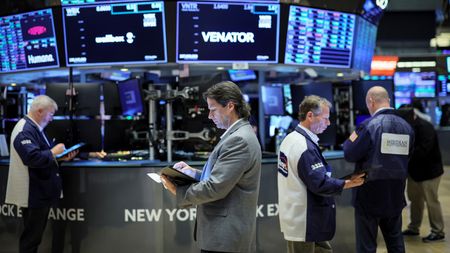By Lawrence Delevingne
(Reuters) – U.S. stocks and oil prices declined in choppy trading on Monday, while the dollar and Treasury yields pushed higher, as Wall Street digested a raft of mixed macroeconomic news.
With markets already jittery from central bank signals of additional interest rate hikes, UK government fiscal plans released on Friday continued to roil markets. Sterling slumped to a record low on Monday and a renewed selloff in British gilts pushed euro zone bond yields higher.
U.S. Federal Reserve officials on Monday sloughed off rising volatility in global markets, from slumping U.S. stocks to currency turbulence abroad, and said their priority remained controlling domestic inflation.
“I think everyone felt they were swimming in a tsunami of newsflow last week after one of the most incredible macro weeks in recent memory,” Deutsche Bank strategist Jim Reid wrote in a client note on Monday.
U.S. stocks were mixed to start the day but soon tuned negative, further giving up their summer gains. The Dow Jones Industrial Average and the S&P 500 both fell around 1%, while the Nasdaq Composite declined by about 0.6%.
Global equities also fell on concerns about high interest rates and their pressure on the financial system, although reaction to Italy’s election, where a right-wing alliance won a clear majority, was muted.
Europe’s STOXX 600 index slipped 0.42% to it’s lowest level since December 2020. Asian stocks outside of Japan fell 1.65%.
Wall Street’s so-called fear index, the VIX, up around 6% on the day – approaching levels not seen since October 2020.
“Here we have investors hit from every which way,” Ken Mahoney, chief executive officer of Mahoney Asset Management in Montvale, New Jersey, said in an email.
“Including inflation not seen in four decades, the Federal Reserve overreacting because they missed the opportunity last year to ‘tap’ the brakes, instead they are slamming on the brakes, and with a stronger dollar it’s going to hurt earnings.”
GRAPHIC – Sterling at all-time low against dollar
https://graphics.reuters.com/BRITAIN-STERLING/zgpomqwjypd/chart.png
STRESS BUILDING
Central to the market’s jitters in recent days has been the pound, which on Monday skidded to an all-time low against the dollar.
The Bank of England said on Monday it would not hesitate to change interest rates and was monitoring markets “very closely” after the pound plunged. Sterling last traded down about 1.4%.
The pound’s decline is partly due to dollar strength, which hit a new 20-year top of 114.58 in early trade. It was last at $114.06, up about 0.8%.
In bonds, Euro zone government debt yields jumped to multi-year highs amid expectations that central banks will keep tightening their monetary policy.
In the U.S., Treasury yields also rose to new highs. Two-year Treasury yields, which tend to be more sensitive to interest rate changes, rose to a near 15-year high of 4.315%, and benchmark 10-year note yields jumped to 3.894%.
In commodities, oil prices hit nine-month lows on Monday in choppy trade, pressured by a strengthening dollar as market participants awaited details on new sanctions on Russia.
U.S. crude fell 2.5% to $76.75 per barrel and Brent last traded at $84.04, down about 2.5% on the day.
Gold prices hovered near a 2-1/2-year low on higher Treasury yields and a stronger dollar, while jitters over rising U.S. interest rates dented appeal for non-yielding bullion.
Spot gold dropped 1.2% to $1,623.4 an ounce, after already hitting its lowest price since April 2020 at $1,626.41.
“There has been an economic logic at play, as central banks raised rates to drive monetary policy into restrictive territory, get below trend growth for a while – a polite way of saying a recession – and then you get lower inflation,” said Samy Chaar, chief economist at Lombard Odier.
“The question is whether the financial world can go through that sequence. It feels like we are reaching the limit of that, things are starting to break, for example what we see with sterling.”
(Reporting by Lawrence Delevingne in Boston, Alun John in London and Tom Westbrook in Sydney; Additional reporting by Harry Robertson in London and Danilo Masoni in Milan; Editing by Toby Chopra, Marguerita Choy, Josie Kao and Sandra Maler)





